British Airways flies to Guyana via St Lucia
March 27, 2023
British Airways landed at the Cheddi Jagan International Airport (CJIA), Timehri on 20 March for the official launch of its twice weekly flights to Guyana via St Lucia.
British Airways Boeing 777-200ER aircraft has the capacity to carry 332 passengers.

In a welcoming ceremony at the airport, Minister of Public Works, Bishop Juan Edghill reflected on the impact that the COVID-19 pandemic had on Guyana’s aviation industry, chronicling the transition from a dire state to the continuous advancement in the sector. Government’s dedication to the modernisation of Guyana’s main entry point once again bears fruit, as the country’s air traffic has grown 25 per cent above pre-pandemic numbers.
“We are growing. And we will continue to grow. So, there are two things we’re doing. We’re expanding facilities at the airport, and we are growing routes.”
Minister within the Public Works ministry, Deodat Indar, echoed the sentiments, adding that hordes of people are arriving following government’s aggressive policy-driven approach to development and heavy investments.
“Guyanese should be proud that what we have now is an environment that can bring more aircraft from different destinations. For an investment decision to fly the Guyana route, it took some amount of doing, some .. calculation and some .. confidence in Guyana and I am hoping that other airways follow suit as British Airways did to fly this route.”
This further enhances connectivity to the Caribbean and the rest of the world.
Minister of Tourism, Industry and Commerce, Oneidge Walrond said that the introduction of the flights presents a myriad of opportunities, including those for additional partnerships.
“Connecting the world to Guyana remains a priority of this government. We see Guyana as an active part of a global travel network and we are continually engaging major airlines with a view to encouraging them to serve this destination. Our pursuit of airline connectivity is part of a wider strategic economic objective to make Guyana easily and affordably accessible to all business in all sectors, including the leisure and pleasure travel sector.”
British High Commissioner, Jane Miller, relayed that this is a transformative step in strengthening the relationship between the UK and Guyana. The direct flights are prefaced by the visa-free travel to the United Kingdom, announced last year. This move to further strengthen government-to-government and people-to-people relations allows Guyanese to visit the UK for up to 180 days or six months without the requirement of a visitor’s visa.
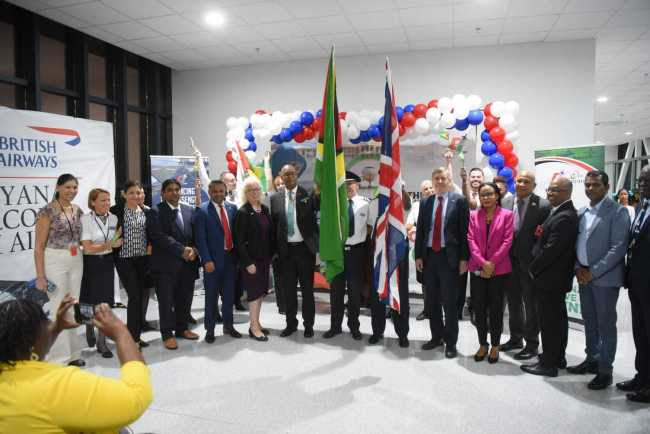
Indian High Commissioner, K.J Srinivasa, St Lucia’s Minister for Tourism, Investment, Creative Industries, Culture and Information, Ernest Hilaire, United Kingdom Parliamentary Under-Secretary of State at the Foreign, Commonwealth, & Development Office, David Rutley, Chairman of the CJIA board, Sanjeev Datadin and CEO, Ramesh Ghir were also in attendance.
NESC
2023, 03/27
Emeritus Professor Brian Copeland has been appointed Chairman of NESC Technical Institute.
Professor Copeland was installed by NESC Board of Governors during a Board Meeting on March 16.
NESC described him as a career academic and innovator who brings decades of experience in education to the Institute. Most recently, Professor Copeland served as Pro Vice-Chancellor and Campus Principal of the UWI St Augustine from 2016 to 2022. Prior to that, he was Professor of Electrical and Computer Engineering, Dean of the Faculty of Engineering, and Head of the Department of Electrical and Computer Engineering.
His research specialties include Digital Electronics, Microprocessor Systems Design, and Control Systems.
He is a recipient of the Order of the Republic of Trinidad and Tobago (2008), and a joint recipient of the Chaconia Medal Gold for development of the G-Pan.
Caricom promotes food security
2023, 03/24
As the effects of climate change continue to worsen, Caricom examines land management sustainability and the conservation of environmental resources to promote food security.
T&T hosted the first day of the Fifth Session of the Partnership Initiative for Sustainable Land Management (PISLM) for Caricom States High-Level Forum in Port-of-Spain. Planning and Development Minister Pennelope Beckles emphasised the importance of reversing land degradation due to regional vulnerability to extreme weather conditions and seismic events.
“It is only fitting that Caricom looks more urgently at our land issues because climate change trends indicate that spells of drought are going to become more frequent, extended and severe. This, of course, jeopardises regional food security and potable water supplies, not to mention the stability of the terrain itself.”
Land in the region is a ‘very finite commodity’ used for infrastructural, commercial, industrial and civil purposes.with no attempt to ensure the restoration of land after planting crops or building construction.
“The land degradation neutrality advocates: avoidance of land degradation, reduction of existing degradation and the restoration of land where it has been degraded to a level of higher productivity. Approximating its original state, the idea being used is so that you can reuse,” Beckles said.
PILSM identified US$90 million for the execution of sustainable land management projects. Beckles said that while engineering solutions could be adopted, natural-based solutions will have a greater benefit to the regional economy.
“Our respective economies would be made more robust and resilient if we adopted nature-based solutions since they not only optimise the provision of ecosystem goods and services, but they also minimise costs, providing in the bargain, economic flexibility to deploy revenue for other purposes.”
UN : improve water security
 Caribbean countries must cooperate to ensure water security in the wake of the intensifying effects of global climate change, to which the region is among the most vulnerable.
Caribbean countries must cooperate to ensure water security in the wake of the intensifying effects of global climate change, to which the region is among the most vulnerable.
There must be collaboration between the public-private sector and civil society for water sustainability to be achieved. This was the position of stakeholders at a seminar on the UN 2023 World Water Development Report for the Caribbean.
The report was prepared by the UN Information Centre for the Caribbean Area (UNIC), in collaboration with the Economic Commission for Latin America and the Caribbean Subregional Headquarters for the Caribbean (ECLAC).
The seminar at ECLAC Port of Spain headquarters, focused on access to water, water security and issues related to the currently high level of global water consumption and how collaboration between government entities, non-government stakeholders and civil society can contribute to globally sustainable use of water. Author and editor-in-chief Richard Connor presented an overview of his report.
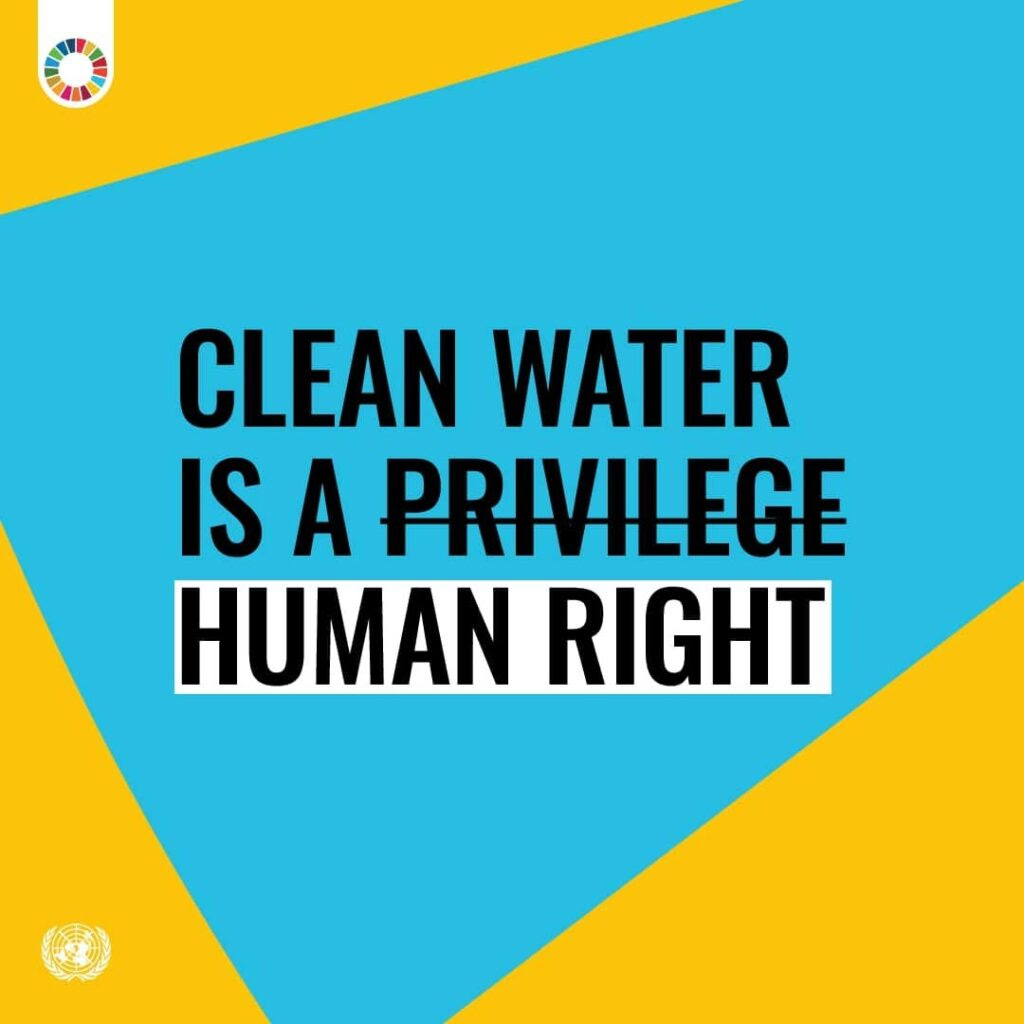
Source – UN
Artie Dubrie, co-ordinator of sustainable development and disaster unit at ECLAC presented a response on the findings in the report and its direct relevance to Caribbean small-island developing states (SIDS.)
Via Zoom, Connor in a presentation titled Partnerships and Co-operation for Water, said global water-consumption levels have increased by one per cent over the past 50 years and are expected to continue along that trajectory for the next 30 years.
He highlighted the increase in global water consumption between 1900 and 2018 – the most drastic increase beginning during the start of the third industrial revolution in the 1950s. The global agricultural industry is the most dominant consumer of water compared to consumption by industries and municipalities.
Global water withdrawals for agriculture increased from 500 km3 per year, 100 km3 in 1950, 2,500 km3 in 2000 to a little under 3,000 km3 18 years later in 2018.
Approximately half the global population experiences severe water scarcity for at least part of the year. The Caribbean is classified among the regions experiencing medium baseline water stress unlike some parts of Asia and South America. Nearly all countries across the globe show signs of risks related to water quality. The Caribbean is at medium risk in this regard.
Outlining the 11 indicators of whether countries are on track toward accomplishing target six of the UN Sustainable Development Goals (SDGs),which has to do with addressing the global issues of access to clean water and sanitation, Connor listed the indicators.
Among the 11 indicators of whether a country is nearing the goal are the proportion of the population using safely managed drinking water services, sanitation services and flow of domestic and industrial wastewater; bodies of water with low levels of pollution and a cultural shift toward improved efficiency of water use over time.
He emphasised the importance of integrating new approaches to manage the use of water, while protecting natural ecosystems.
“Water funds unite public, private and civil-society stakeholders around the common goal of contributing to water security through nature-based solutions and sustainable watershed management.”
Presenting the subregional priorities in the report about water in the Caribbean, Dubrie surveyed the regional priorities that informed ECLAC’s contribution to the report.
Priorities include sustainable development, regional and territorial co-operation, addressing the contributors and impact of climate, sustainability in energy, food, and ecosystems and their relationship to financing, health, data management, education, capacity building, communication while enshrining strategies implemented during the heights of the covid19 pandemic.
Regarding water and sustainability in the region, Dubrie outlined ways through which ECLAC has been collaborating to help the region accomplish the development goal. This can be done by strengthening relevant institutions responsible for water management, designing and implementing public policies to foster economic development and water security, particularly in rural and coastal areas while promoting water legislation and increasing public-private investment.
It is also crucial that active participation of water rights holders such as local communities, youth, indigenous peoples, coastal communities and other vulnerable groups are incorporated.
To manage the impact of climate change on water security in the region, Dubrie said integrated water resources management (IWRM) practices should be used across industries to increase resistance to climate change and mitigate impact of natural disasters.
According to the UN, IWRM is a process that promotes the co-ordinated development and management of water, land and related resources in order to maximise economic and social welfare in an equitable manner without compromising the sustainability of vital ecosystems. This can be accomplished by collaborating with communities on establishing early warning and response systems, using innovation and adoption of technologies to support response and adaptation to new environmental and climatic conditions.
Dubrie said it is necessary to draw on ancestral knowledge of indigenous communities, the knowledge and experiences of people living in coastal and local communities and the perspectives of communities at higher risk and vulnerability to the effects of climate change. Encouraging education on proper rainwater harvesting practices was also highlighted.
On the relationship between water, energy, food and ecosystems, she said the region has been collaborating on sustained and integrated water, soil and energy management, protecting and restoring essential ecosystems for the water cycle, electricity generation, food security and nutrition and with adequate monitoring, while strengthening collaborative community involvement in management.
To accomplish the SDGs requires the participation of all stakeholders as investments in water quantity, quality and continuity are needed more than ever.
Caribbean Development Bank
March 4, 2023
Governance the Key to Fast and Just Renewable Energy Transition
BRIDGETOWN, Barbados
Fast and just. These are the foremost principles which must underpin the renewable energy (RE) transition in the Caribbean, President of the Caribbean Development Bank, Dr Hyginus ‘Gene’ Leon told regional energy sector stakeholders at the start of the Bank’s Regional Regulatory ASERT 2030 (Accelerated Sustainable Energy and Resilience Transition 2030) Dialogue.
He flagged the slow pace of RE implementation and the urgency of the moment.
“…The pace and scale of the implementation of renewable energy in the Caribbean has been unacceptably slow, with an average annual investment in RE capacity averaging US$ 75 million compared to the approximate US$ 1.3 billion per annum which is needed to achieve the regional target.”
He sounded a note of warning about how the slow energy transition will impact economies on a wider scale if not redressed.
“…There can be no sustainable development without sustainable energy. We are well aware that none of our efforts to build resilience and sustainability in the critical sectors of our economies and societies will yield success without an affordable, reliable supply of energy.”
He urged regulators of the sector, to ensure that the renewable energy transition is just and inclusive.
“The matter of a just transition is an area of emphasis because there is a risk that well-capitalised private institutions could profit disproportionately in meeting the scale of investment required, given limitations of fiscal space in the public sector. If inappropriately regulated, vulnerable communities and groups could also benefit less than proportionately from the energy transition.”
He advised that high quality governance of the energy sector was the best defence against this, calling it “the only way to ensure that no one is left behind.”
“When we consider the current challenges that are retarding our progress, whether it be the need to balance the political, technical, and economic objectives; having to treat with legacy issues such as the exclusivity of integrated monopoly utility, and potential stranded assets; or ensuring that risks are allocated appropriately between public and private sectors – the solutions to these and other challenges are a function of governance. Indeed, a mutually agreed approach for an appropriate governance framework will undoubtedly set the scene for an accelerated penetration of RE and ultimately achievement of the regional target.”
The two-day event led by CDB in partnership with the Organization of Caribbean Utility Regulators (OOCUR), gathered decision makers and leaders from energy ministries and regulatory bodies from the Bank’s 19 Borrowing Member Countries (BMCs).
Development partners working in the energy space in the Region attended, including the government of Canada, the government of the United Kingdom, the European Union, the United States Agency for International Development (USAID), Inter-American Development Bank (IDB), and the Caribbean Centre for Renewable Energy and Energy Efficiency (CCREEE).
Key outcomes of the dialogue included stakeholders and regulators identifying priorities for support, and commitments by CDB and partners for technical assistance funding to strengthen regulatory frameworks and capacity across BMCs by BMCs and regulators.
Clear measures were proposed to increase coordination efforts among partners active in supporting regulatory strengthening and reforms. A proposal for a minimum regulatory function (MRF) was necessary for adoption by BMCs for them to unlock private investments in sustainable energy.
CDB and development partners signalled their commitment to support countries in implementing in the short-term, the key elements of an MRF adopted by them.
Suriname
Seismic trio wraps up another phase of 3D survey offshore
MARCH 21, 2023, BY NADJA SKOPLJAK
A consortium of TGS, CGG and BGP has completed the fourth phase of the deepwater 3D seismic survey offshore Suriname from which multi-client data is set to support deep and shallow water bid rounds.
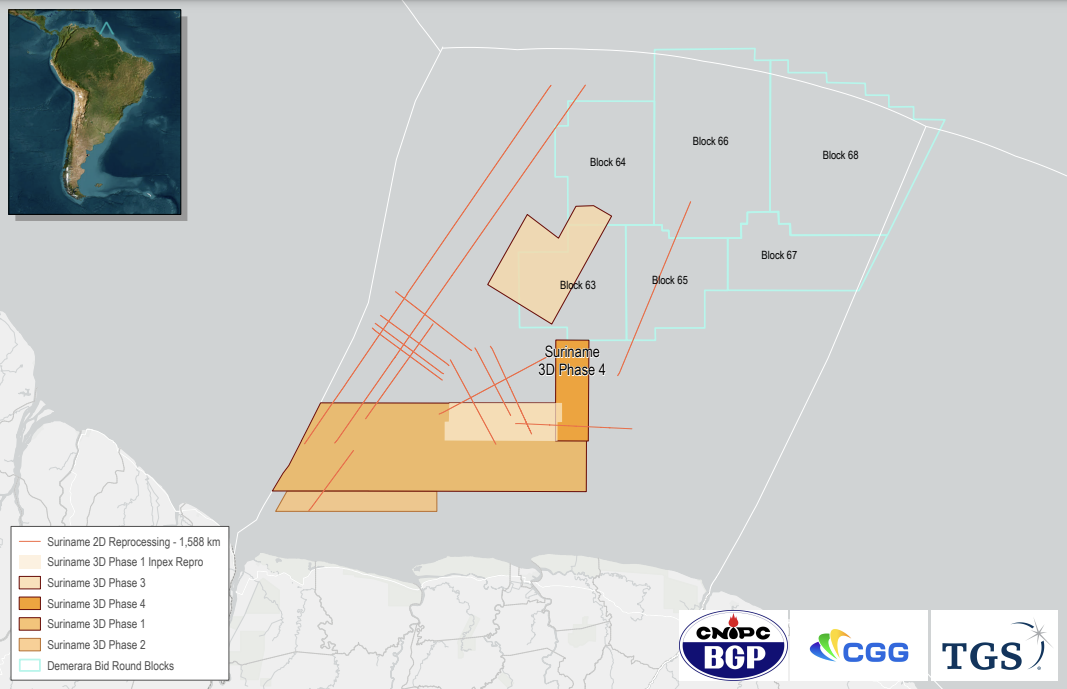
Seismic trio wraps up another phase of 3D survey offshore Suriname Source: TGS
Covering 1,800 square kilometers, Phase IV completes the programmed 14,500 square kilometers survey of newly acquired 3D data in deep and shallow water in the Guyana-Suriname basin. The program also includes over 6,400 square kilometers of reprocessed data.
The seismic trio commenced the acquisition for Phase 1 of the Suriname 3D project in 2021.
David Hajovsky, Executive Vice President, Western Hemisphere at TGS. said,
“Suriname continues to play a vital role in expanding the availability of high-quality data in the Southern Atlantic, a priority for TGS. We’re pleased to partner with CGG and BGP to enhance future exploration in this key region to further support our customer’s investment opportunities, ultimately leading to actionable insights that drive decision-making.”
Fast-track products for this phase are set to be ready for review towards the middle of this year, with the final products for the entire program available in late 2023.
Mark Richards, Senior Vice President of BGP Multi-Client, said the project will help provide clients with a better understanding of this frontier basin, aiding decisions on licensing round opportunities and exploration offshore Suriname.
Dechun Lin, EVP, Earth Data, CGG, said: “With our in-depth knowledge of the Suriname-Guyana region and leadership in high-end imaging technologies, CGG will deliver the high-resolution, high-fidelity images required to better understand Suriname’s full potential.”
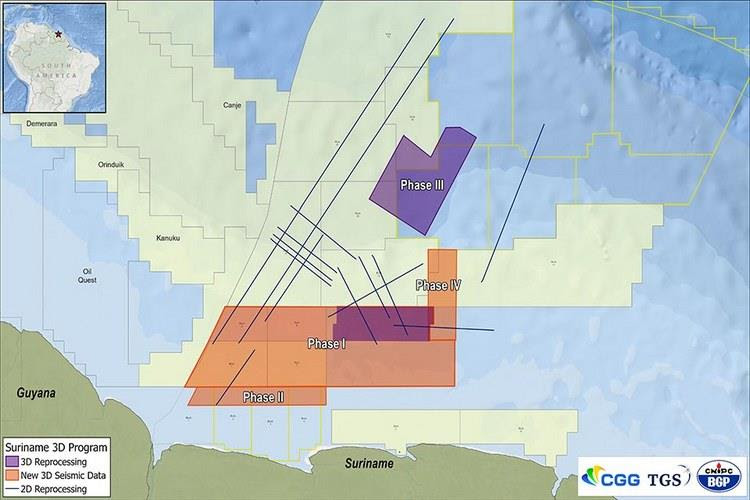
Location of phases of the Suriname 3D survey ( CGG Earth Data). — Source: CGG
IDB
Mar 02 2023
The devastating effects of climate change continue to negatively impact Caribbean economies which are constantly forced to seek “new money” to mitigate against such disasters. Never before has there been such an urgent need to support countries in the region “facing the worst” of the climate crisis.
This was among the issues brought to the fore during a session titled, “Climate-proofing the Caribbean: A partnership for the future” which focused on how countries can work with allies to build sustainable and resilient economies.
Robert Le Hunte, executive director, Bahamas, Barbados, Guyana, Jamaica, and T&T at the Inter-American Development Bank, who was on the panel said the region has been dealing with climate issues for a long time, citing that from 1950 to the present almost 511 disasters have hit the world, the majority of which-over 65 per cent-have affected regions like the Caribbean.
This means that governments have successively been funnelling money to deal with climate issues for quite a while which in turn, reduces financial efforts for other sectors.
“That has retarded our ability to use funding that is required in education and social programmes and so forth. That has been the reality of the governments of the region…this issue, it is estimated has been costing us approximately one per cent of our GDP annually.”
Funding, therefore, is not only required for dealing with climate issues but also for developmental work in the region.
“At the end of the day there’s very little you could do without money and money is needed to help transition from a conversation to implementation,” the former TT Minister of Public Utilities and former managing director of ANSA Bank said.
He also cited an ILO report which stated that the change in temperature will also affect productivity in the region which will have a loss of about 2.5 million jobs, many of which include “low level” employment like street vending.
“The impact on climate issues spreads across from tourism to agriculture to health care to education because it also siphons money away from helping those particular areas develop.”
Having institutions like the IDB and other development banks as part of such conversations allow for first-hand testimonies from various leaders about their aspirations and can enable necessary financing.
The US is also doing its part to help vulnerable countries. US Special Presidential Envoy for Climate John Kerry recently returned from The Bahamas after meeting with Caribbean leaders. Caribbean efforts to protect the region face severe financial and infrastructure challenges and the US stands ready to help, knowing that working together is the best path forward.
The Partnership to Address the Climate Crisis 2030 (PACC 2030) announced by US Vice-President Kamala Harris is one example. The Atlantic Council launched a new working group dedicated to building a roadmap that supports PACC 2030’s implementation. The Atlantic Council is a nonpartisan organisation that galvanises US global leadership and engagement in partnership with allies and partners. On the US policies to assist with climate change Barbara Feinstein, Deputy Assistant Secretary for Caribbean Affairs and Haiti US Department of State who was part of the talks said there are several commitments including expanding blended financing for Caribbean nations.
An expansion for IDB Invest is also being advocated. IDB Invest aims to be the partner of choice for the private sector in Latin America and the Caribbean to finance projects to advance clean energy, modernise agriculture, strengthen transportation systems and expand access to financing.
The effects of the climate crisis run deep, impacting commercial operations as well.
Muhammad Abdullah, Coca-Cola’s vice-president for the Caribbean region noted that the impact on business coming out of climate change is undeniable.
“We have had cases in the Caribbean where the interruption to business is significant as a result of some of the events we are seeing and we are witnessing in many of our countries.”
Expressing concern about how these risks translate to the business environment Abdullah said this ranges from the impact on employees to the customers to the final consumer who are all interrupted in some way or the other.
“I specifically remember Prime Minister Mottley mentioning about the impact of each event. Call it a hurricane for example, going up to as much as five per cent on the impact on the GDP of some of our countries. That definitely has a tangible implication on business and for us sustainability is equal to business and business is equal to sustainability. We are definitely concerned and focused on that.”
Abdullah said the company wants to be part of the solution including by providing sustainable offerings like recyclable packaging. On a large scale, Abdullah recommended the complexities of the region call for “well-studied” objectives to not only guarantee the sustainability side of things but also ensure the business side of things keeps running.
Regarding Coca-Cola’s efforts in this regard Abdullah said, “We have been working individually and with partners across the region. We are working with the ocean clean-up in the Dominican Republic and in Jamaica. We have recycled resin in many of our markets. We have returnable packages as well which we believe help.”
However, he maintained the impact on business is directly associated with how well the challenge of sustainability is embraced in the region.
During the discussions, the Bridgetown Initiative was highlighted as a potential solution.
The Bridgetown Initiative was devised by a group led by Barbados Prime Minister Mia Mottley and her climate finance envoy Avinash Persaud. The idea was first unveiled by Mottley at COP26 Glasgow and further developed with the help of international academics and civil society during a gathering in July 2022 at Bridgetown, Barbados.
So far, the initiative has earned public praise from figures such as French President Emmanuel Macron and IMF managing director Kristalina Georgieva.
The Bridgetown Initiative also aims to overcome some of the main shortcomings of mobilising climate finance for small island developing states (SIDS) like Barbados. It includes five proposals to address immediate liquidity challenges in SIDS and to build a new international financial system that responds better to the climate and development crises for frontline economies including:
• drawing in $5 trillion of private savings for climate mitigation;
• widening access to concessional finance for the climate-vulnerable;
• expanding MDB (multilateral development bank) lending for climate and SDGs by $1 trillion;
• funding loss and damage
• making the financial system more shock absorbent by normalising natural disaster and pandemic clauses in all lending instruments.
Once disasters hit, these clauses lead to an immediate and unconditional suspension of debt service and an extension of the loan maturity by two years.
(Curbing population and . repatriation of the majority to AU domiciles of origin, abounding in resources and free from natural hazards is the best solution to this costly problem.)
Deepwater tubeworm named for UWI don
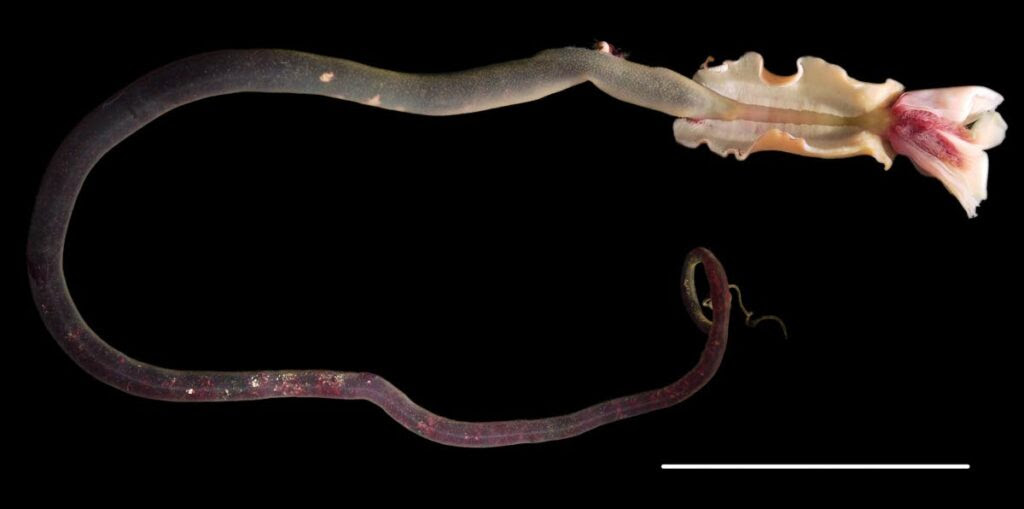
The Lamellibrachia Judigobini aka the “Judiworm,”
A new species of tubeworm discovered in Caribbean waters has been named after benthic marine biologist and UWI professor Judith Gobin.
The scientific name for the tube worm is Lamelliabrachia Judigobini and it was found during deep-sea exploratory missions between 2012 and 2014.
The Judiworm inhabits deep-sea cold seeps and hydrothermal vents between TT and Barbados and ranges into the Gulf of Mexico. Its habitat is at depths from 964-3,304 metres, where fluids rich in hydrogen sulphide and methane leak from the seafloor to give life forms the energy to survive under the harsh conditions, where there is no light, high water pressure and an average temperature of four degrees C.
Like most species that live in such conditions in the region, it survives by chemosynthesis, in the absence of light. The process is similar to photosynthesis in plants.
Tubeworms do not have a gut or a mouth but host bacteria in their bodies for food. The Judiworm is also a keystone species which provides a forest-like habitat for other species living at the seeps. It can grow up to a metre long.
Gobin expressed gratitude to the authors of the study for the honour of having the new species named after her.
“This must surely be a crowning point of my extensive marine career.”
Jamaica
Shell and Zim wrap up first LNG bunkering op in Jamaica
LNG Prime Staff
March 28, 2023
LNG giant Shell and Israel’s shipping firm Zim completed the first LNG bunkering operation in Jamaica as part of their 10-year bunkering deal.
The two firms signed the bunkering deal worth over $1 billion in August under which Shell will supply ten LNG-fueled vessels that Zim will deploy on the Asia to USEC trade.
Earlier this year, South Korea’s Samsung Heavy Industries delivered the first of ten 15,000-teu LNG-powered containerships to owner Seaspan, a unit of Atlas Corp, and charterer ZIM.
The 366 meters long ZIM Sammy Ofer completed a bunkering operation on March 2 in Yangshan port, Shanghai, and now Zim’s first chartered LNG-powered ship received LNG fuel at Kingston Freeport Terminal in Jamaica.
Zim said that the LNG bunkering took place on March 26, the first LNG bunkering operation in Jamaican waters.
The Maritime Authority of Jamaica has supported Shell and ZIM in enabling LNG bunkering in Jamaica.
Shell completed more than 1,000 STS LNG bunkering ops
David Arbel, Zim EVP COO, said that this LNG bunkering operation is a “great achievement” for all parties involved.
“This is the first vessel in our growing LNG-powered fleet that will enable Zim to be more carbon and cost efficient, thereby improving our competitive position, particularly on the strategic Asia to USEC trade, and allowing customers to reduce their carbon footprint.”
Shell’s head of downstream LNG, Tahir Faruqui, said that this “landmark” bunkering expands Shell’s LNG bunkering network to the Caribbean.
“With every new bunkering location added to our footprint, we are demonstrating LNG as the lowest-carbon fuel available at scale today, enabling the shipping sector to start decarbonizing.”
Kingston, Jamaica is a new LNG bunkering location for Shell, expanding its global LNG bunkering network to 16 locations, across 11 countries.
“To date, Shell has already achieved over 1,000 safe ship-to-ship bunkering operations to its customers,” Faruqui said.
